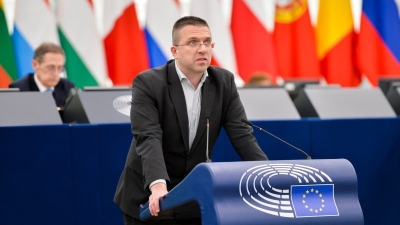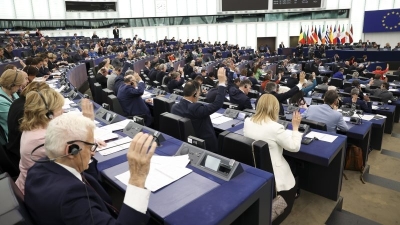EU Commission releases recommendation to combat piracy of live events

The European Commission has released its initiative to combat the piracy of live events, sticking with a non-binding format that has frustrated both Parliamentarians and rightsholders.
The non-binding measure sets out several suggestions for how national authorities, rightsholders and intermediary service providers can better address the issue of piracy of live events.
Action on the subject has long been called for by those in the sports and creative industries who argue that such piracy, which accelerated during the pandemic, has been hitting their revenues.
However, lawmakers in Brussels and industry rightsholders have expressed disappointment that the EU executive has not proposed a legislative instrument in response to their concerns, instead opting for a non-binding format.
“The Internet allows us to watch live sports, concerts and theatre performances from the comfort of our homes more than ever before – but it can also put whole economic models at risk”, said Internal Market Commissioner Thierry Breton, presenting the initiative on Thursday (4 May).
“We already have a solid framework to counter illegal content online, but it has to be enforced. Today, we call on Member States to step up the fight against piracy which demonetises our live event sectors, for example, by allowing sports event organisers to seek an injunction.”
Rightholders call on Commission to tackle piracy of live content
More than 100 media, sports, music and culture organisations have written to the Commission calling for “decisive legislative action” to clamp down on the piracy of live-broadcast content.
The recommendation, the Commission says, is intended to encourage action from all the parties involved to use all existing legal instruments to fight online piracy of live events like football games and concerts.
The recommendation sets out three main focus areas: prompt treatment of notices, dynamic injunctions and commercial offers and awareness.
First, the Commission highlights the importance of swift action by hosting service providers when informed of illegal streaming.
Speaking on Thursday at the release of the initiative, a Commission spokesperson noted the urgency of response, given that revenue from live events declines steeply as they progress and once they finish.
The Digital Services Act (DSA) defines the responsibilities of online actors when it comes to effectively handling illegal content.
However, the recommendation encourages providers to go beyond what is already stipulated in some cases, for instance, by engaging with trusted flaggers and developing technical solutions for addressing live content.

LEAK: EU recommendation on piracy of live events disgruntles rightsholders
The European Commission’s recommendation to fight online piracy of live events focuses on the effective handling of take-down requests, dynamic injunctions, and voluntary cooperation. Still, rightsholders have found its relaxed revision time disappointing.
The second focus area highlights how provisions for court orders requesting the blocking of streaming already have a legal basis in the EU. Still, the recommendation suggests that national judges and administrative authorities work to develop the concept of dynamic injunctions, a more flexible framework that can then be adapted.
In particular, the Commission argues, these dynamic injunctions would allow for tackling issues such as “mirror sites”, pirate replicas of different sites where such illegal streaming occurs.
The third part of the initiative centres on encouraging the organisers and broadcasters of events to boost the availability, affordability and attractiveness of their commercial offers.
It also suggests that member states promote awareness of the legal methods of accessing this content amongst users and of the issue of piracy in general amongst enforcement authorities.
Cooperation is another key theme within the recommendation, between respective national authorities, as well as between rightsholders and intermediaries such as internet service providers and advertising and payment services who are asked to ensure they are not facilitating piracy.
Reactions
Ahead of the release of the recommendation, stakeholders had already begun expressing their disappointment in the Commission’s approach, including the fact that the initiative was non-binding rather than the legislative instrument many rightsholders had called for.
Earlier this week, a group of 24 MEPs also wrote to Commission President Ursula von der Leyen to document their frustrations. They expressed concern that a draft version of the recommendation, obtained by EURACTIV in April, set three years for review of the initiative’s impact.
The timeline was reduced by six months. In the final version, the Commission set a deadline of 17 November 2025 for assessing the recommendation’s effects.
This review will lean on monitoring carried out by the Commission and the EU’s Intellectual Property Office (EUIPO) Observatory, which today begins the process of establishing Key Performance Indicators on which the monitoring will be based.
The recommendation has not been well received by stakeholders, who say it is ineffective and delays an urgent matter.
“This essentially allows the present Commission to deliver little to nothing on this issue (despite a clear Parliamentary mandate to do so) before the end of this mandate; and, simultaneously, makes it very improbable for the next legislature to have the required time to adopt hard legislation if the recommendation is deemed inadequate,” said Grégoire Polad, Director General of the Association of Commercial Television.
“This is a political and unilateral decision that will cost Europe’s creative economy dearly at a time when it needs it most.”

Some MEPs voice disappointment over proposal to fight piracy of live content
A group of 24 cross-party members of the European Parliament have written to European Commission President Ursula von der Leyen to express their disappointment at an initiative to combat the piracy of live events, due for presentation this week.
Read more with EURACTIV




